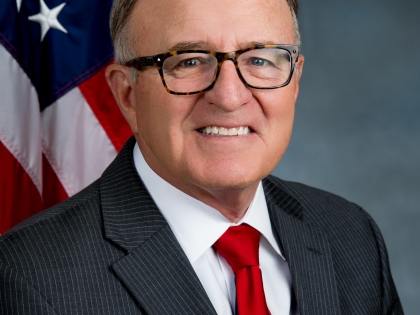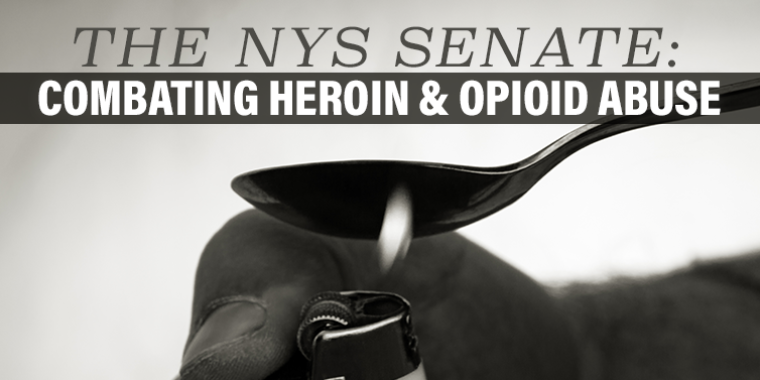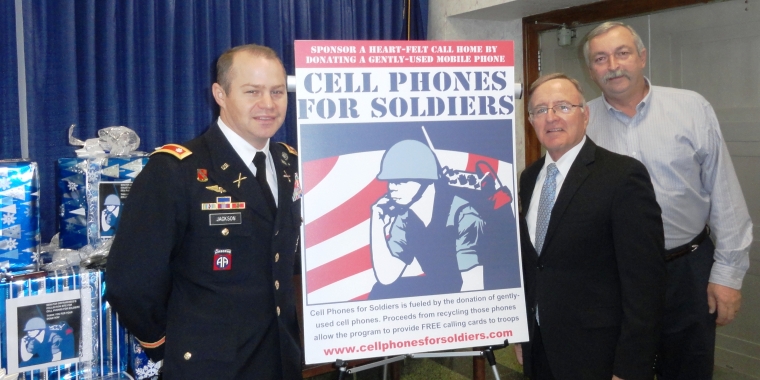
STATE SENATE COMPLETES PASSAGE OF BILL PACKAGE THAT TAKES THE NEXT STEPS TO COMBAT DRUG ABUSE
June 14, 2017

The New York State Senate completed the passage of more than a dozen bills to help end the state’s deadly heroin, opioid, and synthetic drug epidemic. The package focuses on enforcement to hold drug dealers more accountable, regulates many synthetic opioids, bolsters protections for children, and improves the state’s treatment programs to help assist individuals with recovery, among other measures.
The measures were announced at a Senate news conference held yesterday in Albany and builds upon Senate action already taken this session, such as the $214 million the Senate Joint Task Force on Heroin and Opioid Addiction secured in this year’s budget. This record-high level of funding will help improve prevention, treatment, recovery and education services across the state.
Senate Majority Leader John J. Flanagan said, “The Senate continues to be at the forefront of efforts to battle the state’s heroin crisis and was instrumental in securing $214 million in this year’s budget for measures to prevent and treat heroin and opioid abuse. The measures we passed will improve resources for both law enforcement and treatment professionals to help New Yorkers in every corner of our state.”
Senator George Amedore (R-C-I, Rotterdam), Co-Chair of the Senate’s Task Force on Heroin and Opioid Addiction, said, “New York State has been a leader in addressing the heroin and opioid crisis we are facing, thanks in large part to the work being done by the Task Force. I have always advocated a four-pronged approach to address addiction issues: prevention, treatment, recovery and enforcement. The Senate has passed several measures that will ensure our law enforcement officials have the resources they need to cut off the supply of deadly drugs coming into our communities.”
Senator Fred Akshar (R-C-I-Ref, Colesville), Co-Chair of the Senate’s Task Force on Heroin and Opioid Addiction, said, “I’m proud of the comprehensive approach the Joint Task Force has taken, traveling the state and listening to those dealing with the heroin and opioid epidemic every day at the ground level. We acted swiftly to help improve access to drug treatment and prevention services and assist individuals in the recovery process, but we have much more to do. Overdose deaths continue to increase and we must do all we can to give law enforcement the tools they need to drive dealers out of our communities. Regardless of your politics, the heroin and opioid epidemic affects us all. I call on the Assembly to show some leadership, put people before politics and fight for our communities by passing this legislative package.”
Senator Chris Jacobs (60th District), Co-Chair of the Senate’s Task Force on Heroin and Opioid Addiction, said, “Stiffening penalties for drug dealers, restricting the flow of illegal substances and implementing proven and effective methods of treatment for people in recovery are common sense and strategic approaches to combatting the heroin and opioid epidemic. These measures reinforce that our resolve to fight against this public health crisis is as strong as ever.”
Strengthening Enforcement:
Enacting “Laree’s Law” – Holding Drug Dealers Accountable: Bill S2761, sponsored by Senator Amedore, establishes the crime of homicide by sale of an opiate controlled substance. Currently, a person who provides an illicit drug that results in the death of a user can typically only be charged with criminal sale of a controlled substance, allowing those involved in the illicit drug trade to escape prosecution for the deaths caused by their actions.
Creating Drug Free Zones Around Drug or Alcohol Treatment Centers: Bill S1127, sponsored by Senator Akshar, would criminalize the sale of a controlled substance on the grounds of a drug or alcohol treatment center, or within 1,000 feet of such facilities. Statistics show that drug dealers often prey on individuals with addictions by sitting in the immediate vicinity of a drug or alcohol treatment center or methadone clinic waiting for people to come out so they can sell them drugs.
Establishing New Penalties for Heroin Sales: Bill S880, sponsored by Senator Robert Ortt (R-C-I, North Tonawanda), would create appropriate level penalties as it relates to heroin sales, taking into account the lighter weight of heroin. Heroin weighs less than other drugs and therefore more doses of heroin are needed to trigger various criminal offenses.
Making it Easier to Prosecute Heroin Dealers: Bill S638, sponsored by Senator Phil Boyle (R-C-I, Bay Shore), would assist in the prosecution of heroin dealers by creating a presumption that the possession of 50 or more individual packages containing heroin and/or having an aggregate value of $300 is possession with intent to sell. Currently, dealers can carry large quantities of the drug before triggering a felony charge of possession.
Cracking Down on Black Market Prescription Drugs: Bill S2814, sponsored by Senator Kemp Hannon (R, Nassau), would establish the offense of fraudulent prescription, dispensing and procurement of non-controlled substance prescription medications and devices, and establish the offense of unlawful possession of non-controlled substance prescription medications and devices. The gaps in existing law and the growth of a black market make it self-evident that change is necessary. This bill will address the problem by increasing or establishing criminal penalties that better fit these crimes.
Increasing the Penalties for Heroin and Polydrug Offenses: Bill S2744, sponsored by Senator Martin Golden (R-C-I, Brooklyn), would increase the penalties for selling heroin, compounds that include heroin, and "polydrug" compounds that include heroin and another narcotic. Deadly polydrug combinations are gaining in popularity and to stop needless deaths, the bill strengthens penalties for heroin and polydrug offenses as an added disincentive for drug dealers.
Prohibiting Dangerous Synthetic Drugs:
Improving the Regulation of Fentanyl: Bill S5884, sponsored by Senator Jacobs, adds six new derivatives of fentanyl to the controlled substance schedule regulated by the state Department of Health. Fentanyl and fentanyl-combined drugs are a major driver of the many recent overdoses that have occurred across New York State. It is vital for public health and safety to properly regulate this potent drug.
Cracking Down on The Sale of Carfentanil: Bill S623, sponsored by Senator Boyle, would make the sale of 2 milligrams or more of Carfentanil a Class A-II felony and the sale of 10 milligrams or more of Carfentanil a Class A-I felony. Carfentanil is synthetic opioid and a schedule II controlled substance, which is 100 times deadlier than fentanyl, and 10,000 times stronger than morphine.
Conforming State Controlled Substances With Federal Schedules: Bill S5357, sponsored by Senator Hannon, updates the state controlled substances schedules, promoting consistency with the federal schedules and promoting health and safety. Consistency between the state and federal schedules is important to address the prevalence of abuse and misuse of controlled substances. The bill would also add other known dangerous substances to the state’s schedule of controlled substances, including a synthetic opioid analgesic, often is known as AH-7921, which can cause a deadly psychoactive reaction.
Protecting Children from Drug Abuse:
Toughening Penalties for Sale of a Controlled Substance to Minors: Bill S3845, sponsored by Senator Kathy Marchione (R-C-I-Reform, Halfmoon), would help curb rising drug abuse among high school students and other youth by making the sale of a controlled substance by an adult to a minor under the age of 14 a class A-II felony.
Limiting Children’s Opioid Exposure: Bill S5949, sponsored by Senator Akshar, helps address the increasing risk of children becoming addicted to opioids and heroin after being prescribed painkillers for medical procedures or illegally sharing extra prescriptions. The bill requires a health practitioner to receive written consent from a minor’s parent or legal guardian in order to prescribe a medical treatment containing opioids, as well as to discuss the risks of addiction and dangers of overdose associated with the medication. The bill also limits the prescription for a controlled substance containing an opioid to a seven-day duration unless there is a medical emergency that puts the child’s health or safety at risk.
Preventing Addiction and Facilitating Successful Recoveries:
Requiring Patient Counseling Prior to Issuing a Prescription for a Schedule II Opioid: Bill S5670, sponsored by Senator Akshar, requires health care practitioners to consult with a patient regarding the quantity of an opioid prescription and the patient’s option to have the prescription written for a lower quantity. The physician must also inform the patient of the risks associated with taking an opiate medication, and the reason for issuing the medication must be documented in the patient’s medical record.
Preventing Predatory and Deceptive Substance Abuse Treatment: Bill S6544, sponsored by Senator Akshar, makes it a crime to offer to or accept any kickback from an individual or entity that provides substance abuse services in exchange for patient referral and admission. There has been a rise in individuals who aggressively pursue people in need of substance use disorder treatment services and, for a sometimes-extravagant fee, promise admission to treatment programs. For individuals engaging in this predatory behavior, the most desirable patients are those with robust insurance coverage, and out-of-network benefit packages. Patient brokers refer these clients to programs offering the highest rate of "return" to the patient broker, with little or no regard for the patient's specific needs. This predatory practice capitalizes on, and exploits, families' fears while putting patients at risk of inappropriate treatment.
Expanding Access to Funding for State Substance Abuse Services: Bill S898, sponsored by Senator Amedore, authorizes the state Office of Alcoholism and Substance Abuse Services (OASAS) to provide funding to substance use disorder and/or compulsive gambling programs operated by for profit agencies. Current statute states all funds issued by OASAS to provide addiction prevention, treatment and recovery services must be awarded to non-profit providers. For-profit organizations, which provide similar services are unable to apply for state contracts through OASAS and such restrictions limits competition within the RFP process that would ensure state dollars are being used in the most efficient way possible.
The bills will be sent to the Assembly.
In addition to the bills passed this week, the Senate previously passed legislation bolstering regulation and penalties for fentanyl derivatives. Bill S933A, sponsored by Senator Thomas Croci (R, Sayville), adds new derivatives of fentanyl to the controlled substance schedule and increases criminal penalties for the sale of an opiate containing a fentanyl derivative.
#####
Share this Article or Press Release
Newsroom
Go to Newsroom

Veterans Day 2014 - Saluting Those Who Served
November 10, 2014

Senator DeFrancisco Recognizes 2014 OCC Alumni Faces Honorees
October 10, 2014
